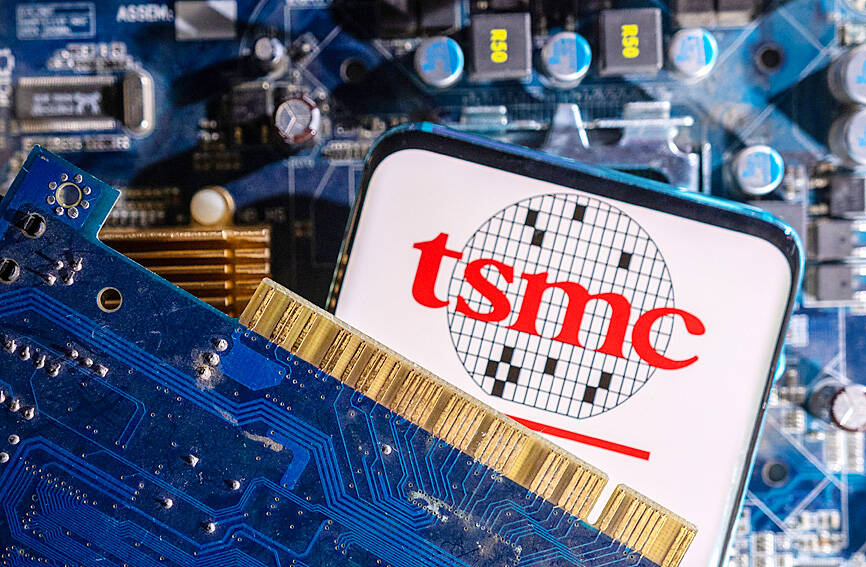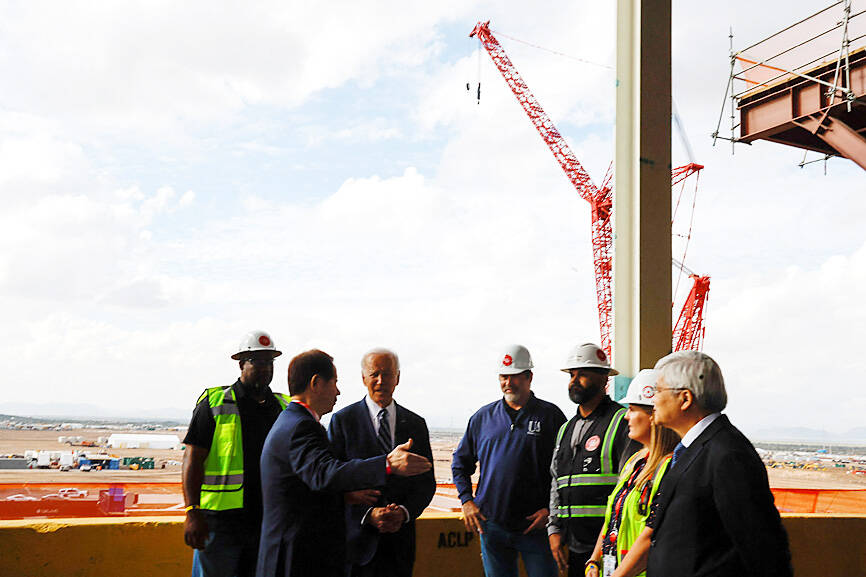Taiwan Semiconductor Manufacturing Co (TSMC, 台積電) is studying the feasibility of a fab in Europe, the chipmaker said in response to a Taiwanese media report stating that it is planning to build a plant in Dresden, Germany.
The Chinese-language Commercial Times reported yesterday that the company has chosen the German semiconductor hub of Dresden for a fab, with production slated to start in 2025.
The report said the investment in Germany would meet strong European demand for TSMC’s specialty processes and mitigate potential geopolitical barriers.

Photo: Reuters
Citing sources from within TSMC’s supply chain, the report said the proposed fab would make use of Dresden’s comprehensive semiconductor ecosystem and better serve its EU clients.
Major international semiconductor firms including Infineon Technologies AG, Robert Bosch GmbH, GlobalFoundries Inc, X-Fab Silicon Foundries SE and NXP Semiconductors NV have run fabs in Dresden, while semiconductor equipment suppliers, including Applied Materials Inc, ASML Holding NV and Siltronic AG have also established production bases in the city.
TSMC is building fabs in Arizona to manufacture chips using 4-nanometer (nm) and 3nm processes, with mass production scheduled to begin next year.

Photo: Reuters
It is also building a plant in Japan that is to use the company’s 12nm, 16nm and 22nm processes, as well as 28nm specialty technology, with commercial production expected to start next year.
TSMC last week said it considers clients’ needs and available government support when choosing locations for new ventures.
It is considering building a fab in Germany to develop chips used in automotive electronics and specialty processes, TSMC said, adding that a second fab in Japan is also being discussed.
The company is assessing plans for a German plant and no decision has been made, TSMC spokeswoman Nina Kao (高孟華) said.
However, an editorial published yesterday by Taiwan’s Central News Agency (CNA) said that the EU should not get a Taiwanese semiconductor plant if the European Commission does not engage in trade talks with Taipei.
The EU seeks chip investments to safeguard its supply chain, but without help from the likes of TSMC and Intel Corp, the EU could find it difficult to secure advanced chipmaking capabilities, the editorial said.
“The EU wants Taiwan to set up chip plants, but for Taiwan there is no need to do so from a corporate perspective,” CNA wrote. “If the EU only wants chips from Taiwan but shies away from talking diplomacy, will Taiwan, with its global strategic assets, be this naive?”
Tensions between Beijing and Taipei have escalated as the US asserts its power to counter China’s influence in the region.
Taiwan’s dominant role in the global market for advanced chips is boosting its strategic position, while the country has been aggressively seeking to deepen trade and other relations with the West.
The CNA editorial also criticized an EU official for saying that the 27-member bloc did not need a bilateral investment agreement with Taiwan.
European External Action Service Asia Pacific managing director Gunnar Wiegand on Wednesday last week said that stable conditions and a well-functioning legal system in Taiwan meant it was “rational” for the EU not to seek such an agreement.

PATENTS: MediaTek Inc said it would not comment on ongoing legal cases, but does not expect the legal action by Huawei to affect its business operations Smartphone integrated chips designer MediaTek Inc (聯發科) on Friday said that a lawsuit filed by Chinese smartphone brand Huawei Technologies Co (華為) over alleged patent infringements would have little impact on its operations. In an announcement posted on the Taiwan Stock Exchange, MediaTek said that it would not comment on an ongoing legal case. However, the company said that Huawei’s legal action would have little impact on its operations. MediaTek’s statement came after China-based PRIP Research said on Thursday that Huawei filed a lawsuit with a Chinese district court claiming that MediaTek infringed on its patents. The infringement mentioned in the lawsuit likely involved

Taipei is today suspending work, classes and its US$2.4 trillion stock market as Typhoon Gaemi approaches Taiwan with strong winds and heavy rain. The nation is not conducting securities, currency or fixed income trading, statements from its stock and currency exchanges said. Authorities had yesterday issued a warning that the storm could affect people on land and canceled some ship crossings and domestic flights. Taiwan Semiconductor Manufacturing Co (TSMC, 台積電) expects its local chipmaking fabs to maintain normal production, the company said in an e-mailed statement. The main chipmaker for Apple Inc and Nvidia Corp said it has activated routine typhoon alert

GROWTH: TSMC increased its projected revenue growth for this year to more than 25 percent, citing stronger-than-expected demand for AI devices and smartphones The Taiwan Institute of Economic Research (TIER, 台灣經濟研究院) yesterday raised its forecast for Taiwan’s GDP growth this year from 3.29 percent to 3.85 percent, as exports and private investment recovered faster than it predicted three months ago. The Taipei-based think tank also expects that Taiwan would see a 8.19 percent increase in exports this year, better than the 7.55 percent it projected in April, as US technology giants spent more money on artificial intelligence (AI) infrastructure and development. “There will be more AI servers going forward, but it remains to be seen if the momentum would extend to personal computers, smartphones and

Catastrophic computer outages caused by a software update from one company have once again exposed the dangers of global technological dependence on a handful of players, experts said on Friday. A flawed update sent out by the little-known security firm CrowdStrike Holdings Inc brought airlines, TV stations and myriad other aspects of daily life to a standstill. The outages affected companies or individuals that use CrowdStrike on the Microsoft Inc’s Windows platform. When they applied the update, the incompatible software crashed computers into a frozen state known as the “blue screen of death.” “Today CrowdStrike has become a household name, but not in